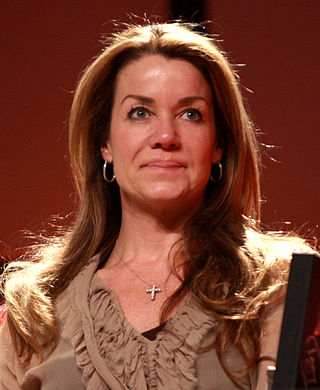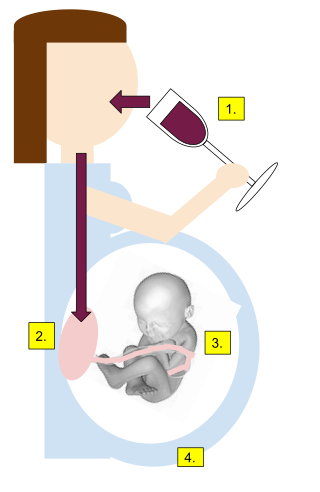
Alcoholics Anonymous (AA) is a global peer-led mutual aid fellowship begun in the United States dedicated to abstinence-based recovery from alcoholism through its spiritually inclined twelve-step program. AA's twelve traditions, besides stressing anonymity, establish it as non-professional, unafiliated, non-denominational and apolitical with a public relations policy stressing attraction rather than promotion. In 2020 AA estimated a worldwide membership of over two million, with 75% of those in the US and Canada.

Alcoholism is the continued drinking of alcohol despite negative results. Problematic use of alcohol has been mentioned in the earliest historical records, the World Health Organization (WHO) estimated there were 283 million people with alcohol use disorders worldwide as of 2016. The term alcoholism was first coined in 1852, but alcoholism and alcoholic are stigmatizing and discourage seeking treatment, so clinical diagnostic terms such as alcohol use disorder or alcohol dependence are used instead.

Alcohol abuse encompasses a spectrum of unhealthy drinking behaviors which range from consuming more than 2 drinks per day on average for men, or more than 1 drink per day on average for women, to binge drinking or alcohol use disorder.

Disulfiram is a medication used to support the treatment of chronic alcoholism by producing an acute sensitivity to ethanol. Disulfiram works by inhibiting the enzyme aldehyde dehydrogenase, causing many of the effects of a hangover to be felt immediately following alcohol consumption. Disulfiram plus alcohol, even small amounts, produces flushing, throbbing in the head and neck, a throbbing headache, respiratory difficulty, nausea, copious vomiting, sweating, thirst, chest pain, palpitation, dyspnea, hyperventilation, fast heart rate, low blood pressure, fainting, marked uneasiness, weakness, vertigo, blurred vision, and confusion. In severe reactions there may be respiratory depression, cardiovascular collapse, abnormal heart rhythms, heart attack, acute congestive heart failure, unconsciousness, convulsions, and death.

Claudia Christian is an American actress, singer, and author, known for her roles as Commander Susan Ivanova on Babylon 5, as Captain Maynard on Fox's 9-1-1, and as the voice of Hera on the Netflix series Blood of Zeus. She is also the voice of Lt. Helga Sinclair in Atlantis: The Lost Empire. She is the founder and CEO of the C Three Foundation, a proponent of the medication-based Sinclair Method for treating alcohol dependence.

Alcohol dependence is a previous psychiatric diagnosis in which an individual is physically or psychologically dependent upon alcohol.
"The Hellgramite Method" is the forty-second episode and the seventh episode of the third season (1988–89) of the American television series The Twilight Zone. In this episode, an alcoholic has a vicious alcohol-consuming parasite implanted in him.

Naltrexone, sold under the brand name Revia among others, is a medication primarily used to manage alcohol use or opioid use disorder by reducing cravings and feelings of euphoria associated with substance use disorder. It has also been found effective in the treatment of other addictions and may be used for them off-label. An opioid-dependent person should not receive naltrexone before detoxification. It is taken by mouth or by injection into a muscle. Effects begin within 30 minutes, though a decreased desire for opioids may take a few weeks to occur. Side effects may include trouble sleeping, anxiety, nausea, and headaches. In those still on opioids, opioid withdrawal may occur. Use is not recommended in people with liver failure. It is unclear if use is safe during pregnancy. Naltrexone is an opioid antagonist and works by blocking the effects of opioids, including both opioid drugs as well as opioids naturally produced in the brain.

Apomorphine, sold under the brand name Apokyn among others, is a type of aporphine having activity as a non-selective dopamine agonist which activates both D2-like and, to a much lesser extent, D1-like receptors. It also acts as an antagonist of 5-HT2 and α-adrenergic receptors with high affinity. The compound is historically a morphine decomposition product made by boiling morphine with concentrated acid, hence the -morphine suffix. Contrary to its name, apomorphine does not actually contain morphine or its skeleton, nor does it bind to opioid receptors. The apo- prefix relates to it being a morphine derivative ("[comes] from morphine").

An opioid antagonist, or opioid receptor antagonist, is a receptor antagonist that acts on one or more of the opioid receptors.

Acamprosate, sold under the brand name Campral, is a medication used along with counseling to treat alcohol use disorder.
The modern disease theory of alcoholism states that problem drinking is sometimes caused by a disease of the brain, characterized by altered brain structure and function. Today, alcohol use disorder (AUD) is used as a more scientific and suitable approach to alcohol dependence and alcohol-related problems.

Nalmefene is a medication that is used in the treatment of opioid overdose and alcohol dependence. Nalmefene belongs to the class of opioid antagonists and can be taken by mouth, administered by injection, or delivered through nasal administration.
Bankole A. Johnson, DSc, MD, MPhil, FRCPsych is a Nigerian psychiatrist. He served as Alumni Professor and Chairman of the Department of Psychiatry and Neurobehavioral Sciences at the University of Virginia and is known for his research into addiction.
Olivier Ameisen was a French-American cardiologist who wrote a best-selling book about curing alcoholism using the drug baclofen.

Charles P. O'Brien is a research scientist, medical educator and a leading expert in the science and treatment of addiction. He is board certified in neurology, psychiatry and addiction psychiatry. He is currently the Kenneth E. Appel Professor of Psychiatry, and vice chair of psychiatry, in the Perelman School of Medicine at the University of Pennsylvania.
Subjective response to alcohol (SR) refers to an individual's unique experience of the pharmacological effects of alcohol and is a putative risk factor for the development of alcoholism. Subjective effects include both stimulating experiences typically occurring during the beginning of a drinking episode as breath alcohol content (BAC) rises and sedative effects, which are more prevalent later in a drinking episode as BAC wanes. The combined influence of hedonic and aversive subjective experiences over the course of a drinking session are strong predictors of alcohol consumption and drinking consequences. There is also mounting evidence for consideration of SR as an endophenotype with some studies suggesting that it accounts for a significant proportion of genetic risk for the development of alcohol use disorder.

Alcohol use in pregnancy includes use of alcohol at any time during gestation, including the time before a mother-to-be is aware that she is pregnant. Alcohol use at some point during pregnancy is common and appears to be rising in prevalence in the United States.
John David Sinclair was an American scientist and researcher best known for discovering the Alcohol Deprivation Effect (ADE) and targeted pharmacological extinction, otherwise known as the Sinclair Method, as a medication treatment for Alcohol Use Disorder (AUD).

Joseph R. Volpicelli is an American psychiatrist, research scientist, medical academic, and expert in the treatment of addictive disorders. He is Professor Emeritus, Perelman School of Medicine at the University of Pennsylvania. He is board certified in neurology, psychiatry and addiction psychiatry. He currently is Medical Director at Volpicelli Center, an out-patient addiction treatment facility in Plymouth Meeting, Pennsylvania, as well as the Executive Director at Institute of Addiction Medicine, a non-profit research entity also in Plymouth Meeting, Pennsylvania.














